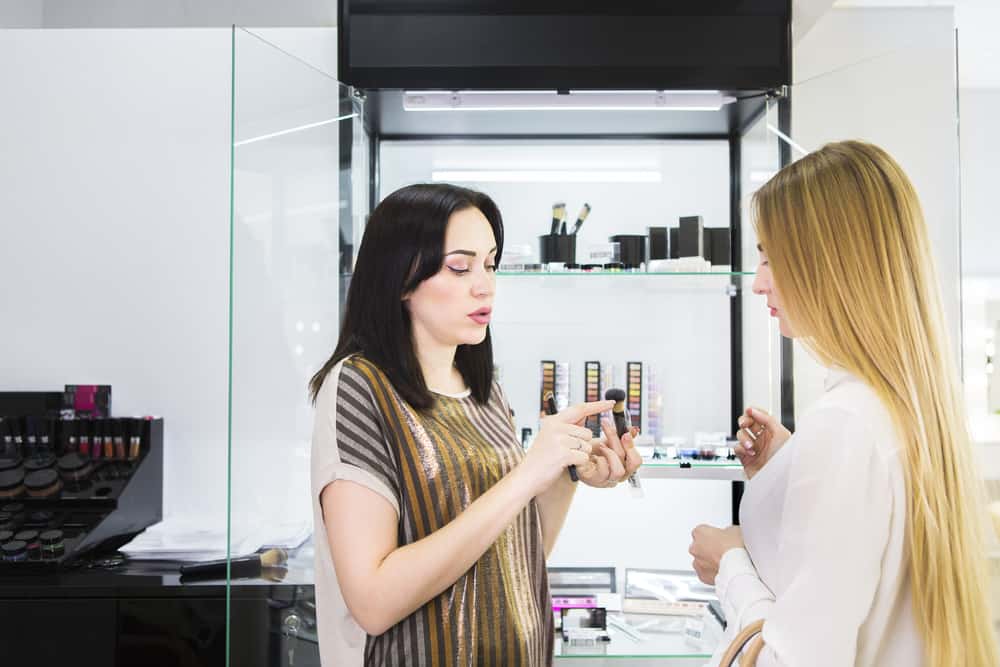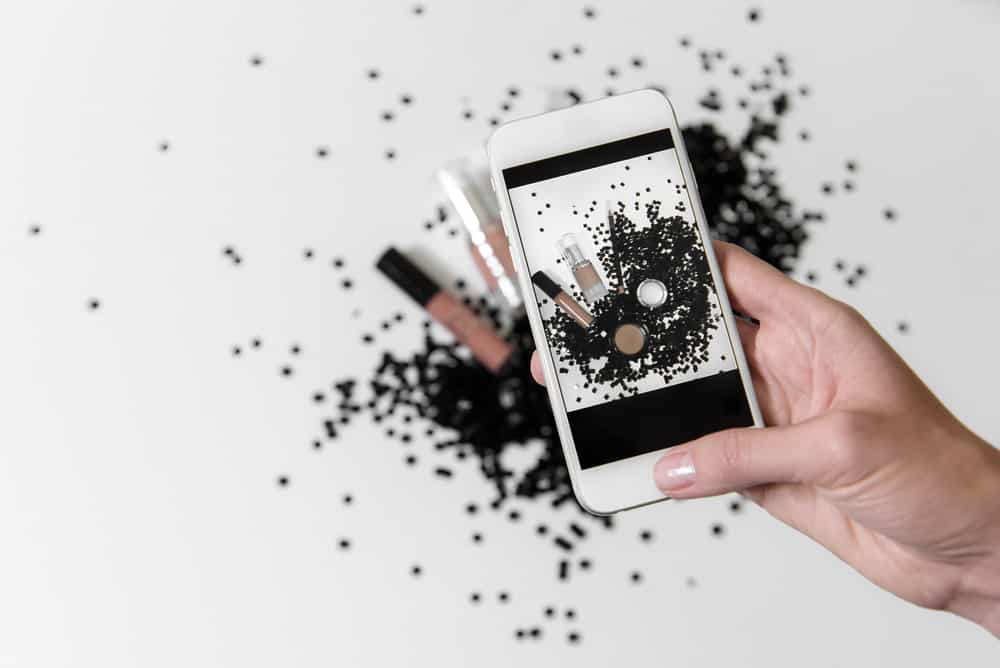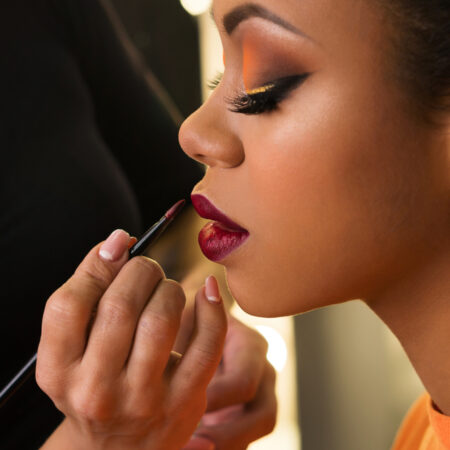Can you see yourself standing next to Ariana Grande, carefully applying her latest look for the Grammy Awards performance as she chats to you about the struggles of being rich and famous? How about getting a host of supermodels ready for a Milan fashion show?
Looks like the life of a makeup artist is calling you. But what steps do you need to take now to get where you want to be in the future?
Realistically, it’s going to take a while to progress to clients of the caliber of Ms. Grande, but you never know what you could achieve over time with a little vision and dedication. To give yourself the best chances possible, make sure you know all there is to know about launching yourself as a makeup artist.
Fortunately, we’re here to talk you through every step of the way.
Qualifications and Training Needed
Becoming a makeup artist isn’t quite as highly regulated as becoming a lawyer or a doctor, but that doesn’t mean that anyone can wake up one day and start selling their makeup services (at least, not without landing in some trouble). So, what makes the difference between a no-hoper and a promising young makeup artist at the start of their career?
For the most part, the answer is simple: attending makeup artist school.
Over six months of training, makeup artist school will teach you everything you need to know about proper hygiene principles, applying makeup artistically, and in some cases, other principles of cosmetology — and you’ll graduate with a qualification to show employers.
Here’s how it all works.
Certifications and Regulation
In the United States, the regulation concerning who can become a makeup artist is decided by each state. Specifically, each state has its own licensing board, which legislates how long training programs need to be, what content needs to be covered, and any exams that need to be passed to start practicing as a certified makeup artist.
So, when choosing a makeup artist school, it’s very important to make sure you select an institution that actually complies with a state’s regulations. You don’t want all that hard work to be for nothing!
Generally, programs last between 300 to 600 hours, which works out to about six months in total if you study full-time. Many schools also offer their students the chance to study part-time, which would result in the course taking closer to a year to complete.
There are also some states that don’t have any requirements — but that doesn’t mean you don’t need to go to school. Realistically, you’re unlikely to make a successful go of your career if you don’t have the training and accreditation to back you up initially.
Makeup Artistry vs. Cosmetology
If you’re 100% certain that you want to become a makeup artist, the most logical step is to take a makeup artistry course — or so you’d think.
While this route is available and it can be a great option, many people prefer to give themselves a wider knowledge base by studying a cosmetology course instead. This will give students a knowledge of not just makeup but also other areas of beauty, such as skincare and haircare (although there’s plenty of variation between programs).
The benefits are clear — you’ll have a broader range of career opportunities available to you, and the high number of skills and knowledge you’ll pick up are likely to make you more employable.
Of course, there’s a catch.
Cosmetology programs generally take around 1500 to 2000 hours to complete (again, this varies depending on the state licensing board). That’s about five times longer than a makeup artistry program! The longer length also makes these programs more expensive.
Different Types of Makeup Artistry
If you’re only just starting to look into the possibility of becoming a makeup artist, you probably haven’t had much chance to consider the different paths or roles available within the career. Well, it’s worth taking some time to think about it now.
Although we tend to use the term “makeup artist” as if everyone with this job title does the exact same thing, the reality is that there’s plenty of variation. Some makeup artists prepare people for theater and films, while others get “normal” people ready for their weddings, proms, or other special occasions. Then there are the makeup artists aiding celebrities and catwalks.
Naturally, the skills you’ll need differ hugely depending on the context of your makeup looks. An actor that needs to be seen by the audience from the back row of the theater and the woman who wants a natural, subtle look for her wedding day are two very different clients!
If you already have an idea of what you might like to specialize in, this could serve as a crucial comparison point between schools. Perhaps some institutions will have links with businesses in certain sectors or offer classes related to a specific topic of interest — it’s definitely something worth asking the admissions office about.
Training on the Job

Although attending makeup artist school is the most common path to becoming a makeup artist, it’s not necessarily your only option — unless you happen to live in a state that requires certain qualifications, of course.
Some people prefer a more hands-on approach and start off by working at a makeup counter or in a store, which allows them to learn the fundamentals of makeup artistry while earning money.
This is also a great way to test the waters if you’re unsure whether makeup artistry is the right career for you — or perhaps you could even pursue it as a part-time job while you study.
Another option you could consider is volunteering, especially if you want to go into a very specific field, like theater makeup.
However, unless you get very lucky or make the right connections, these types of opportunities might not be enough to land you a prestigious job in the field unless they’re combined with the right qualifications.
How to Succeed As a Makeup Artist
It’s easy to look at the requirements outlined above and assume that once you have your qualification in the bag, the clients are going to come knocking. But as we’ve all been told a million times by our parents, teachers, and anyone else who gets the chance, it’s not that easy anymore (if it ever was).
If you’re looking for some more actionable tips on achieving success as a working makeup artist, you’re in the right place.
Market Yourself

Most makeup artists dream of being known for the unique style they’ve developed or their mastery of a certain technique. Once upon a time, this fame could only be achieved through luck, capturing the attention of someone influential, or working your way up the ladder slowly.
Now, the internet and social media have changed everything. Anyone can curate their online presence and stand a good chance of being noticed if their content is good enough. Could you be the next beauty vlogger with one million subscribers?
A social media or web presence serves as a live portfolio and can lead to new opportunities. Why wouldn’t you want to take advantage of that?
Study the Greats
If you were considering launching a career as a painter or novelist, the first advice you’d hear would probably be to study the old masters in the area. Yet when it comes to makeup artistry, many would-be professionals assume they can simply complete their training, stop learning outside of working hours, and still reach the top of their profession.
But makeup artistry is art — the clue’s in the name. If you’re serious about being the best you can be, it’s time to get serious about practicing, studying, and trying to follow in the footsteps of those who came before you.
Whether it’s celebrity makeup artists, YouTube beauty vloggers, or late greats like Kevyn Aucoin, find individuals you admire and try to imitate their style. Over time, you’ll learn your strengths and weaknesses and what you like and dislike, allowing you to develop your own unique style and flair.
Ultimately, this is what separates decent makeup artists from outstanding makeup artists. Which side of the camp will you fall on?
Look For Extra Opportunities
Makeup artistry is a competitive profession — if you want to get to the top, you need to do some serious hustling!
Even when you have a full-time job, it doesn’t mean it’s time to stop looking for opportunities. Can you take on extra freelance gigs or contact an agency to bring you even more work?
Don’t worry, you won’t need to do this for your entire career, but working extremely hard for those first few years results in a snowball effect, enabling you to build up industry contacts that will lead to more opportunities further down the line. Your future self will thank you!
What Not to Do
Just as important as knowing what to do is acknowledging what you shouldn’t be doing. Before you go any further, be (very) aware of these common mistakes.
Decide Certain Jobs Are Beneath You
We get it — even when you’re first starting out, you’re so aware of your potential and enthusiasm that you only want to accept jobs you feel reflect that. But it’s tough to get started, so you should at least give every opportunity that comes your way some serious consideration.
You never know if it could end up helping you to meet someone important or become a bridge to something better.
This principle isn’t unique to the world of makeup artistry, and you’ve probably heard it said before, but it’s so important that it’s worth reiterating.
Get Too Friendly With Clients
When you land your first “big-name” client (and trust us, it will happen!), it’s going to be tempting to try and become their best friend. If your work has granted you the opportunity to have an intimate conversation with someone you admire for hours as you apply their makeup, of course you’ll want to tell them how much you admire them.
But it’s important to maintain an aura of professionalism — at least until you’ve developed a solid relationship with the client and you know how friendly they want to be with you.
Sacrifice Your Integrity
As a makeup artist, your livelihood depends on people trusting you for your know-how regarding beauty. It’s easy to think that the occasional white lie or the use of a beauty product that you haven’t fully researched won’t catch up with you, but don’t be so sure.
Even if you “get away with it” in front of your clients themselves, other makeup artists might find out, resulting in you gaining a bad reputation. What’s the point?
Besides, it’s far more satisfying to take pride in what you do and go to work every day knowing that you’re helping your clients look as good as they can to the best of your ability. Shortcuts might be tempting, but they’re just not worth it.
Go Make It in the Makeup World
Still determined to become a makeup artist? Good for you! By now, you’ve probably realized that you have a long, hard road ahead of you, but there’s no reason you won’t be able to achieve all of your goals (and more) in time.
Now, it’s time to get out there and make some moves before you lose all that momentum! Get ringing admissions offices for makeup schools near you, apply for that position at a beauty counter nearby, and start creating your own personal portfolio. We believe in you!
